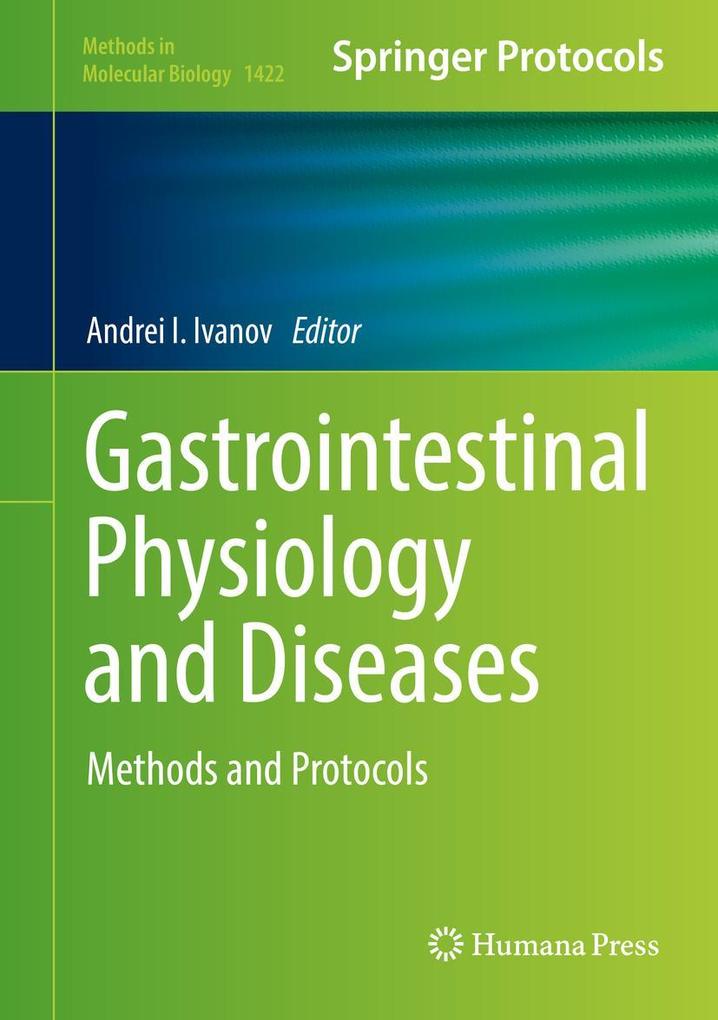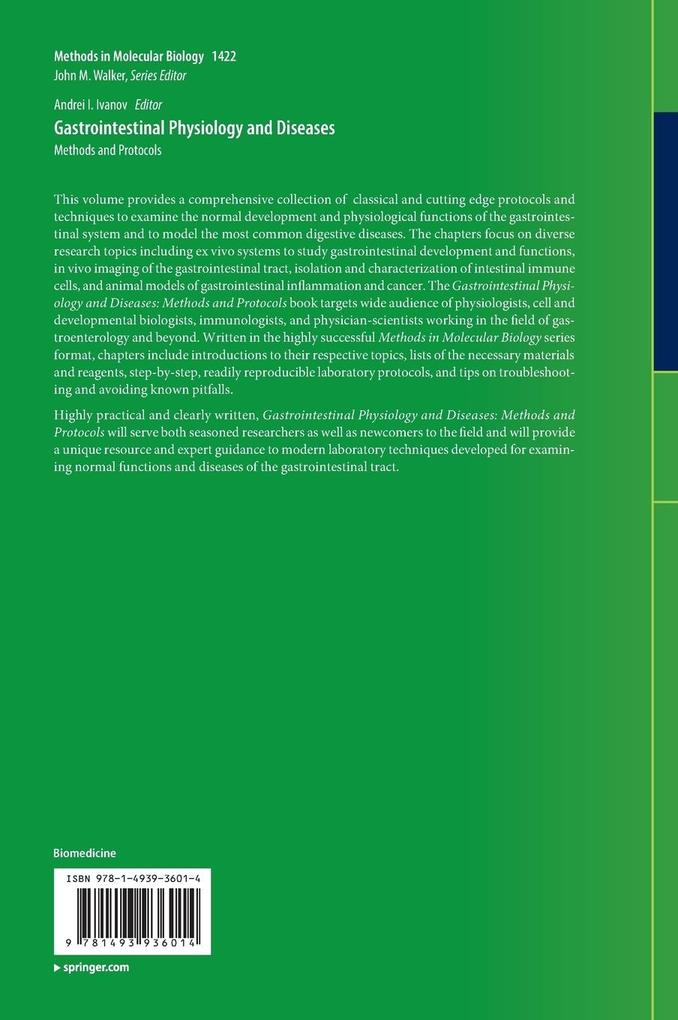
Zustellung: Do, 26.06. - Mo, 30.06.
Versand in 1-2 Wochen
VersandkostenfreiBestellen & in Filiale abholen:
This volume provides a comprehensive collection of classical and cutting edge protocols and techniques to examine the normal development and physiological functions of the gastrointestinal system and to model the most common digestive diseases. The chapters focus on diverse research topicsincluding ex vivo systems to study gastrointestinal development and functions, in vivo imaging of the gastrointestinal tract, isolation and characterizationof intestinal immune cells, and animal models of gastrointestinal inflammationand cancer. The Gastrointestinal Physiology and Diseases: Methods andProtocols book targets wide audience of physiologists, cell and developmental biologists, immunologists, and physician-scientistsworking in the field of gastroenterology and beyond. Written in the highly successful Methods in Molecular Biology series format, chapters includeintroductions to theirrespective topics, lists of the necessary materials andreagents, step-by-step, readily reproducible laboratory protocols, and tips ontroubleshooting and avoiding known pitfalls.
Highly practical and clearly written, Gastrointestinal Physiology andDiseases: Methods and Protocols will serve both seasoned researchers as well asnewcomers to the field and will providea unique resource and expert guidance to modern laboratory techniques developedfor examining normal functions and diseases of the gastrointestinal tract.Inhaltsverzeichnis
CRISPR/Cas9 mediated
Genome-editing of Mouse Small Intestinal Organoids. - Lentivirus-based
Stable Gene Delivery into Intestinal Organoids. - Co-culture of
Gastric Organoids and Immortalized Stomach Mesenchymal Cells. - An Air-Liquid
Interface Culture System for 3D Organoid Culture of Diverse Primary
Gastrointestinal Tissues. - Organotypical
Tissue Cultures from Fetal and Neonatal Murine Colon. - Using Chamber Technique to Measure Intestinal Epithelial
Permeability. - HPLC-based Metabolomic Analysis of Normal and
Inflamed Gut. - NMR-based
Metabolomic Analysis of Normal and Inflamed Gut. - Analysis
of microRNA Levels in Intestinal Epithelial Cells. - Detecting Reactive Oxygen Species Generation and Stem
Cell Proliferation in the Drosophila
Intestine. - Imaging Inflammatory Hypoxia in the Murine Gut. - Label-free Imaging of Eosinophilic Esophagitis Mouse
Models Using Optical Coherence Tomography. - Near Infrared Fluorescence Endoscopyto Detect
Dysplastic Lesions in the Mouse Colon. - Visualization
of Signaling Molecules during Neutrophil Recruitment in Transgenic Mice
Expressing FRET Biosensors. - In Vivo
Myeloperoxidase Imaging and Flow Cytometry Analysis of Intestinal Myeloid Cells. - Macrophage
Isolation from the Mouse Small and Large Intestine. - Isolation
and Functional Analysis of Lamina Propria Dendritic Cells from the Mouse Small
Intestine. - Purification and Adoptive Transfer of Group 3 Gut Innate
Lymphoid Cells. - Immunotherapy with iTreg and nTreg Cells in a Murine
Model of Inflammatory Bowel Disease. - Isolation of Eosinophils from the Lamina Propria of the
Murine Small Intestine. - Investigation of
Host and Pathogen Contributions to Infectious Colitis Using the Citrobacter rodentium Mouse Model of
Infection. - Murine Trinitrobenzoic Acid-induced Colitis as a Model of Crohn s
Disease. - Oxazolone-induced Colitis as a Model of Th2 Immune
Responses in the Intestinal Mucosa. - The Mongolian Gerbil: A Robust Model of Helicobacter pylori-induced Gastric
Inflammation and Cancer. - A Rapid Screenable
Assay for Compounds that Protect Against Intestinal Injury in Zebrafish Larva. - AOM/DSS Model of Colitis-Associated Cancer. - Characterization
of Colorectal Cancer Development in Apc min/+
Mice. - Modeling Murine Gastric
Metaplasia through Tamoxifen-Induced Acute Parietal Cell Loss. - The Hamster Buccal Pouch Model
of Oral Carcinogenesis.
Produktdetails
Erscheinungsdatum
01. Juni 2016
Sprache
englisch
Auflage
1st edition 2016
Seitenanzahl
372
Herausgegeben von
Andrei I. Ivanov
Verlag/Hersteller
Produktart
gebunden
Abbildungen
XV, 353 p. 87 illus., 62 illus. in color.
Gewicht
896 g
Größe (L/B/H)
260/183/26 mm
ISBN
9781493936014
Entdecken Sie mehr
Bewertungen
0 Bewertungen
Es wurden noch keine Bewertungen abgegeben. Schreiben Sie die erste Bewertung zu "Gastrointestinal Physiology and Diseases" und helfen Sie damit anderen bei der Kaufentscheidung.










